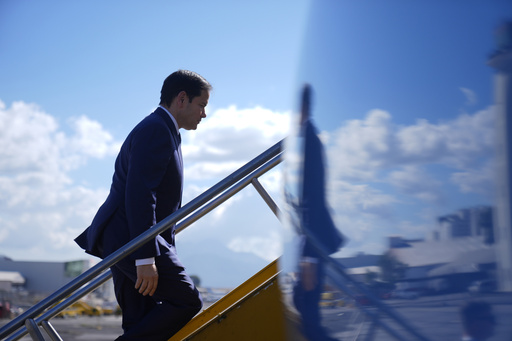GUATEMALA CITY — President Bernardo Arévalo of Guatemala announced on Wednesday that his nation will accept migrants being deported from the United States. This agreement marks the second deportation partnership established during Secretary of State Marco Rubio’s recent tour of Central America, which has primarily concentrated on immigration matters.
According to Arévalo, the deportees will be processed back to their respective home countries with costs covered by the U.S. government. “We have agreed to increase by 40% the number of flights for deportees, including our own nationals and those from other countries,” Arévalo stated during a news briefing alongside Rubio.
Historically, Guatemala has accepted approximately seven to eight flights weekly carrying its citizens deported from the U.S. Throughout the Trump administration, the nation has been a location where migrants were returned using U.S. military aircraft.
In a similar move, El Salvador’s President Nayib Bukele announced on Monday that his country would accept deportees of all nationalities, which even includes American citizens and legal residents incarcerated for violent offenses. Both Trump and Rubio voiced concerns over the legal complexities surrounding the transfer of U.S. individuals to another nation for incarceration.
Trump conveyed, “I would act on it in a heartbeat if we had the legal right. We are currently reviewing the legality.” Rubio agreed, characterizing it as a “very generous offer” but noted the legal implications involved, saying, “We have a Constitution.”
Rubio’s emphasis on immigration aligns with priorities established during the Trump administration. His recent tour includes visits to five Central American countries: Panama, El Salvador, Costa Rica, Guatemala, and the Dominican Republic. The agreements with Guatemala and El Salvador may provide essential solutions for the administration since not all undocumented individuals in the U.S. can be easily repatriated.
Venezuelan migrants, for instance, have been a significant population seeking residence in the U.S., yet it is rare for the U.S. to send them back to Venezuela. However, the U.S. has already established a robust network for sending deportees to various Central American nations.
Guatemala is set to enhance its ability to accommodate not only its citizens but also migrants from other nations who will subsequently be sent back to their home countries upon resolution of the details. Arévalo emphasized that the permanent solution to immigration issues lies in fostering development to eliminate the need for individuals to flee their homeland. In light of this aim, a high-level delegation from Guatemala, inclusive of private sector representatives, will visit Washington in the coming weeks.
Additionally, Arévalo revealed plans to create a new border security task force tasked with maintaining order at the borders with Honduras and El Salvador. This force, comprising both police and military personnel, will combat various forms of transnational crime.
Rubio’s visit faced scrutiny amid the federal government’s reduction of the U.S. Agency for International Development personnel, which culminated in an abrupt order to nearly withdraw all agency staff. After concluding the conference with Arévalo, Rubio proceeded to the U.S. Embassy to meet with staff members and their families, who expressed uncertainty about their roles in light of recent changes. Both events held in Guatemala and El Salvador were closed to the press, unlike Rubio’s previous event in Panama.
In his visit, Rubio explored a local migration processing facility located near an airforce base, where deportees are prepared for reintegration into their communities. The new measures are expected to increase the volume of deportees received by as much as 40%, a strategy endorsed by the State Department and the Department of Homeland Security.
Rubio also received updates on Guatemala’s counter-narcotics initiatives, which included the recent interception of significant fentanyl precursor shipments. These efforts have thwarted a total of 127.5 kilograms (280 pounds) of drugs, enough to create over 114 million doses of fentanyl.
Acknowledging the national interest, Rubio has introduced exemptions to Trump’s sweeping freeze on foreign aid, signing waivers to ensure that critical programs will continue to be funded.
“This is an example of foreign aid that aligns with our national interests. That’s why I’ve issued a waiver for these programs,” Rubio explained. “These initiatives will be operational, showcasing to the American public that this is the type of foreign support in accordance with our foreign policy.”
Additionally, Rubio engaged in discussions with Mexican Foreign Secretary Juan Ramón de la Fuente on strategies to enhance security at the U.S.-Mexico border, combat fentanyl trafficking, and curb illegal immigration, according to statements from the State Department.



